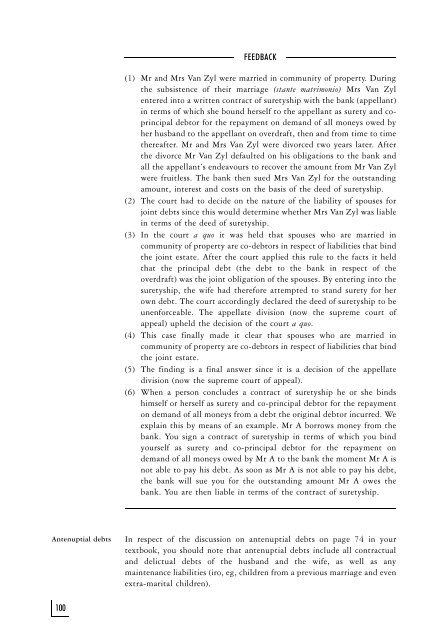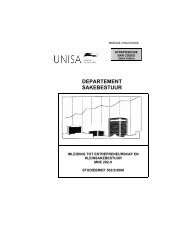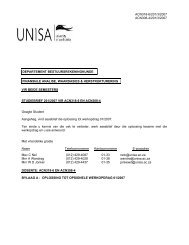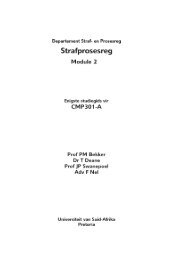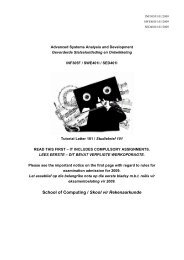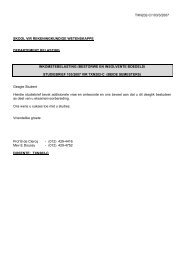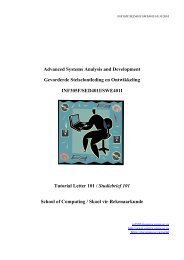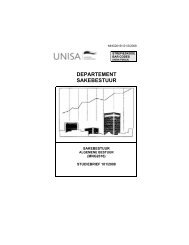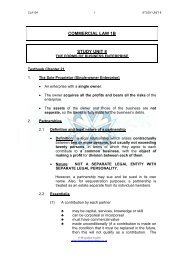key to the study guide - Name
key to the study guide - Name
key to the study guide - Name
Create successful ePaper yourself
Turn your PDF publications into a flip-book with our unique Google optimized e-Paper software.
FEEDBACK<br />
(1) Mr and Mrs Van Zyl were married in community of property. During<br />
<strong>the</strong> subsistence of <strong>the</strong>ir marriage (stante matrimonio) Mrs Van Zyl<br />
entered in<strong>to</strong> a written contract of suretyship with <strong>the</strong> bank (appellant)<br />
in terms of which she bound herself <strong>to</strong> <strong>the</strong> appellant as surety and coprincipal<br />
deb<strong>to</strong>r for <strong>the</strong> repayment on demand of all moneys owed by<br />
her husband <strong>to</strong> <strong>the</strong> appellant on overdraft, <strong>the</strong>n and from time <strong>to</strong> time<br />
<strong>the</strong>reafter. Mr and Mrs Van Zyl were divorced two years later. After<br />
<strong>the</strong> divorce Mr Van Zyl defaulted on his obligations <strong>to</strong> <strong>the</strong> bank and<br />
all <strong>the</strong> appellant's endeavours <strong>to</strong> recover <strong>the</strong> amount from Mr Van Zyl<br />
were fruitless. The bank <strong>the</strong>n sued Mrs Van Zyl for <strong>the</strong> outstanding<br />
amount, interest and costs on <strong>the</strong> basis of <strong>the</strong> deed of suretyship.<br />
(2) The court had <strong>to</strong> decide on <strong>the</strong> nature of <strong>the</strong> liability of spouses for<br />
joint debts since this would determine whe<strong>the</strong>r Mrs Van Zyl was liable<br />
in terms of <strong>the</strong> deed of suretyship.<br />
(3) In <strong>the</strong> court a quo it was held that spouses who are married in<br />
community of property are co-deb<strong>to</strong>rs in respect of liabilities that bind<br />
<strong>the</strong> joint estate. After <strong>the</strong> court applied this rule <strong>to</strong> <strong>the</strong> facts it held<br />
that <strong>the</strong> principal debt (<strong>the</strong> debt <strong>to</strong> <strong>the</strong> bank in respect of <strong>the</strong><br />
overdraft) was <strong>the</strong> joint obligation of <strong>the</strong> spouses. By entering in<strong>to</strong> <strong>the</strong><br />
suretyship, <strong>the</strong> wife had <strong>the</strong>refore attempted <strong>to</strong> stand surety for her<br />
own debt. The court accordingly declared <strong>the</strong> deed of suretyship <strong>to</strong> be<br />
unenforceable. The appellate division (now <strong>the</strong> supreme court of<br />
appeal) upheld <strong>the</strong> decision of <strong>the</strong> court aquo.<br />
(4) This case finally made it clear that spouses who are married in<br />
community of property are co-deb<strong>to</strong>rs in respect of liabilities that bind<br />
<strong>the</strong> joint estate.<br />
(5) The finding is a final answer since it is a decision of <strong>the</strong> appellate<br />
division (now <strong>the</strong> supreme court of appeal).<br />
(6) When a person concludes a contract of suretyship he or she binds<br />
himself or herself as surety and co-principal deb<strong>to</strong>r for <strong>the</strong> repayment<br />
on demand of all moneys from a debt <strong>the</strong> original deb<strong>to</strong>r incurred. We<br />
explain this by means of an example. Mr A borrows money from <strong>the</strong><br />
bank. You sign a contract of suretyship in terms of which you bind<br />
yourself as surety and co-principal deb<strong>to</strong>r for <strong>the</strong> repayment on<br />
demand of all moneys owed by Mr A <strong>to</strong> <strong>the</strong> bank <strong>the</strong> moment Mr A is<br />
not able <strong>to</strong> pay his debt. As soon as Mr A is not able <strong>to</strong> pay his debt,<br />
<strong>the</strong> bank will sue you for <strong>the</strong> outstanding amount Mr A owes <strong>the</strong><br />
bank. You are <strong>the</strong>n liable in terms of <strong>the</strong> contract of suretyship.<br />
Antenuptial debts In respect of <strong>the</strong> discussion on antenuptial debts on page 74 in your<br />
textbook, you should note that antenuptial debts include all contractual<br />
and delictual debts of <strong>the</strong> husband and <strong>the</strong> wife, as well as any<br />
maintenance liabilities (iro, eg, children from a previous marriage and even<br />
extra-marital children).<br />
100


